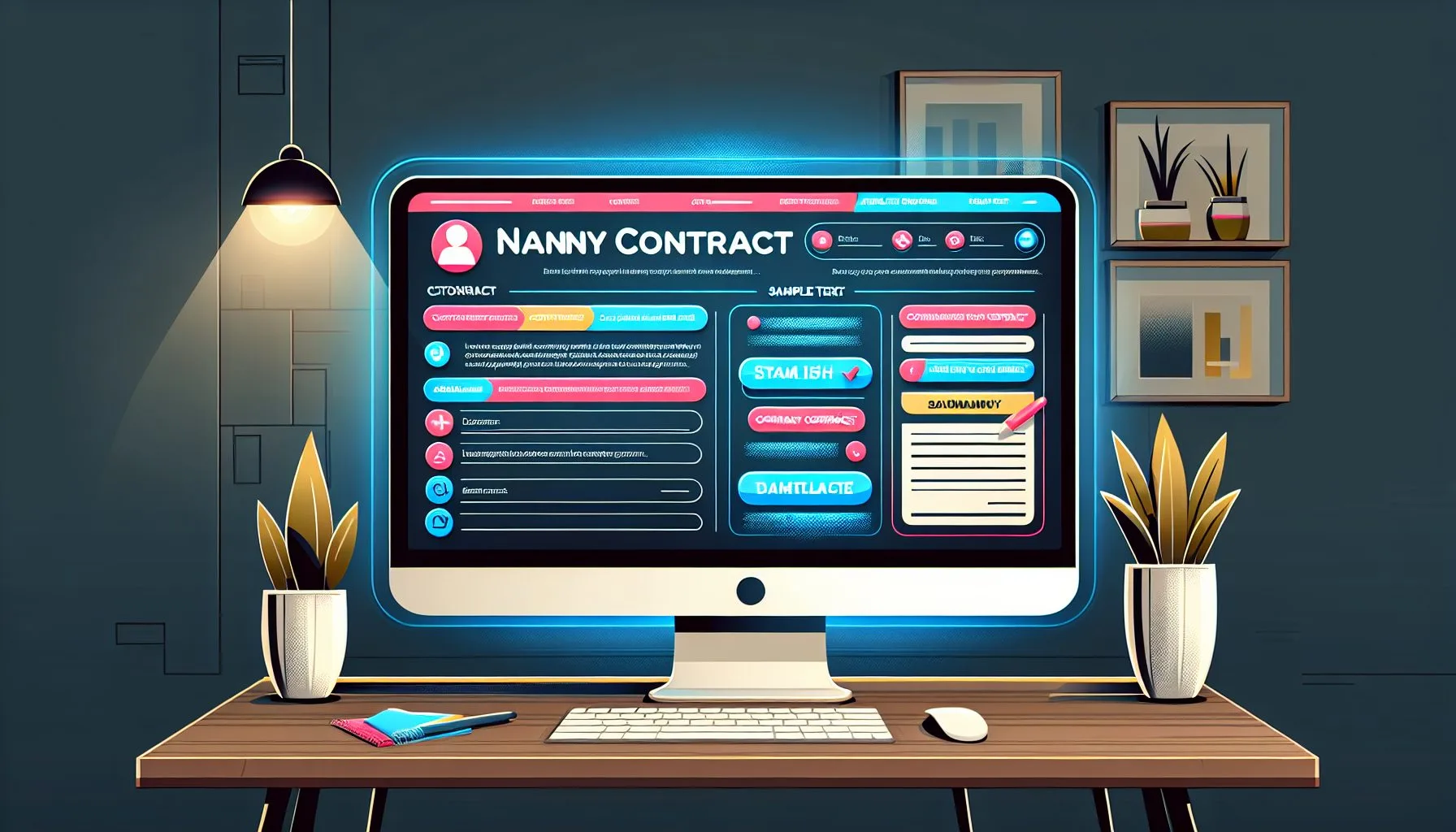Need an easy-to-use nanny contract template to clarify expectations and protect both your family and your nanny? In this article, we provide a comprehensive guide to creating a nanny contract. You can download a free example nanny contract template and customize it to your needs. Read on to determine what key elements to include and how to ensure your agreement is on par.
Key Takeaways
- A nanny contract outlines the engagement terms between employers and nannies, defining duties and setting expectations to prevent misunderstandings.
- Key elements of a nanny contract include employment details, work schedule, compensation and benefits, job responsibilities, confidentiality clauses, tax withholding, and termination policies.
- Customizing the nanny contract template is essential to meet specific needs, ensuring clarity, legal compliance, and a positive working relationship.
What is a Nanny Contract?

A nanny contract acts as a guide that outlines the terms of employment between the family and their caregiver. It aims to outline the responsibilities and duties of the nanny.
This helps set clear expectations for both parties in this arrangement. Such precision serves to prevent misunderstandings while offering protection to both parties. Mommybites.com details situations when parents have no written agreement between themselves and the nanny and problems can arise.
These contracts are important for creating a shared understanding. Contracts outline house rules, like no smoking, having guests, use of the family’s property and more. They also set standards for disciplining children, which helps create a peaceful living environment in the home.
Typically included in these agreements are tasks central to a nanny’s role. Usually, caring for children is the main focus, but preparing meals and doing other tasks related to the job are included as well.
Adding these details to a contract makes expectations fully known, which is important for understanding what is needed while being part of another family’s life.
Key Elements of a Nanny Contract
A nanny contract includes important parts that help ensure direct communication and follow legal rules. Included within these components are:
- Specifics of employment
- Hours of work
- Salary and benefits package
- Duties expected from the nanny
- Clause ensuring confidentiality
- Details pertaining to tax deductions
- Policies regarding contract termination
For crafting an all-encompassing and effective agreement with a nanny, each aspect mentioned is fundamental.
Employment Details
A nanny employment contract is important for creating a good work relationship. It helps both the family and the nanny know what to expect from each other. The contract should include important details like the start date of employment and the work location. It should also have contact information for everyone involved.
Additionally, the nanny’s contract should list the number of children the nanny will care for, along with their legal names and contact details. Specifying the period of employment with start and conclusion dates is also wise, even if it’s open-ended.
Crafting a detailed contract serves to legally formalize agreements between engaged parties. Therefore, everyone must define and mutually agree upon every section of the agreement. Such accurate documentation lays down a strong groundwork conducive to fostering mutual benefits within this professional engagement involving childcare responsibilities.
Work Schedule
To prevent any confusion regarding work expectations and working hours, a precise and comprehensive work schedule is essential. It should clearly list the hours the nanny works and include the days they will be on duty. It should also state their exact start and finish times.
Finally, the contract should outline any other duties expected of them. By doing this, both parties have an accurate understanding of the working timetable to organize their activities around.
Along with scheduling details, it’s important for employment contracts to state payment rates for nannies. This includes situations when overtime applies and explains how extra pay calculates for different shifts or requirements, which helps prevent disagreements about the job. It also encourages positive relationships between household care providers.
Compensation and Benefits
The compensation section of the contract should state the total pay and how the nanny will be paid. This includes hourly rate, overtime rates, and the payment schedule. You will typically add reimbursement for travel expenses to a nanny’s usual hourly earnings.
Hours worked over 40 in a week earn one-and-a-half times pay because of overtime rules. Be sure to follow state-specific laws. Care.com outlines the specific pay rates per state in their yearly guide.
Make sure to include benefits like health insurance and help with healthcare costs in the work agreement. This includes setting rules for paid time off and covers both vacation days and sick leave. This way, there is no confusion about these employment terms.
The agreed-upon work arrangement usually grants nannies two weeks’ worth of paid holidays each year. It needs to be clear in the agreement whether the family or the nanny chooses the dates.
Job Responsibilities
Review a nanny job description in detail to help avoid any confusion about their role. These duties include childcare techniques, following meal and nap schedules, and other tasks like light cleaning and running errands. By doing this, expectations are set right from the beginning.
A nanny’s extra duties may include cooking meals for children, caring for household pets, and doing laundry. When transporting children in a vehicle, nannies must follow speed limits, and should not text or use social media while driving.
Nannies should only use hands-free devices for calls, and should not allow unauthorized passengers in the car.
Lastly, transportation guidelines need precise stipulations regarding when and how nannies can transport the children they’re caring for. Define house rules and specific preferences for raising children. This includes rules about food and discipline.
Confidentiality Clause
The confidentiality clause protects the family’s private information. It limits how details about their personal life can be shared. This ensures that sensitive data remains confidential.
Tax Withholding
Employers must withhold federal taxes from a nanny’s pay, as stated in their contract. You can choose to withhold income taxes. However, check your state guidelines to correctly classify the nanny as an employee or an independent contractor.
When hired as an independent contractor, nannies are accountable for managing their own tax and insurance payments. Improper classification of a nanny may result in substantial legal repercussions.
To prevent misunderstandings about taxes and legal problems, the nanny contract should state all tax withholding information. This ensures both parties have full comprehension of their respective responsibilities concerning taxation matters.
Termination Policy
An explicit policy on termination delineates the procedures to conclude the employment relationship, serving as a safeguard against potential confusions. The contract should say how much notice the family or the nanny must give if they want to end the work arrangement.
Clauses regarding dismissal should articulate legitimate grounds for ending employment and stipulate the necessary duration of advance notification required from both sides.
These details give assurance and clarity to everyone involved. They help both the family and the nanny understand what could lead to ending their working relationship. This understanding creates a sense of stability in their agreement.
How to Write a Nanny Contract

Start by getting a free nanny contract template. You can adjust it to fit your household’s specific needs.
The document should include full identification details. This means the full name, postal address, and contact information for both the family and the nanny. You must define all job responsibilities for the nanny. This includes their pay, such as hourly wage and payment schedule, as well as any extra benefits.
Consulting a legal expert, like Rocket Lawyer, is wise when creating a nanny agreement. This helps ensure that you follow all relevant laws. Make sure the wording within this agreement remains straightforward, providing clarity on obligations and expectations for everyone involved.
Customizing Your Nanny Contract Template
Tailor the nanny contract template to cater to your unique requirements. Carefully outlining details into the nanny contract will establish clear understanding and set shared expectations for both families and nannies.
Include clauses that permit changes in the agreement, ensuring any changes are made with joint approval. Arrange regular performance appraisals for assessing the work of the nanny. These reviews may also serve as occasions to make revisions to the contract.
Implementing and Reviewing the Nanny Contract

Creating a nanny contract sets up a structure that supports a healthy working relationship. Commence compensation for the nanny following the completion of the agreement, thereafter managing any tax matters.
Make sure to document any changes to the nanny contract whenever employment terms shift. This keeps everything clear and ensures everyone agrees.
Live-In vs. Live-Out Nanny Contracts

Live-in nanny agreements should detail the provisions for living quarters, often encompassing meal inclusion and private areas. The complete income for live-in nannies might reflect the addition of room and board, adding to the total pay structure. Contracts with a live-in nanny may allow for more flexible hours and duties than fixed schedules where the nanny does not live with the family.
Work arrangements for nannies who do not live on premises typically establish specific working times. This approach guarantees tracking of time and roles expected from both parties. This helps make expectations clear-cut between the household employing them and the non-resident caregiver.
Legal Considerations
A nanny agreement acts as a safeguard, offering protection to both involved parties from possible disagreements. Depending on the terms, a nanny may be deemed an employee or an independent contractor within the jurisdiction of state or federal laws. Any changes made to this contract must receive written approval from those who have entered into the agreement.
Should any issues come up concerning this agreement, it is advisable for the nanny to consult with their own legal advisor. This step guarantees that each party has a complete understanding of their rights and duties as outlined by the terms of their contract.
Free Nanny Contract Template Download
Access our free nanny contract template in either Microsoft Word format or PDF. This template is perfect for customizing to your specific child care needs.
Summary
A well-drafted nanny contract is essential for setting expectations and protecting both the family and the nanny. Including employment details, work schedules, compensation and benefits, job responsibilities, confidentiality clauses, tax withholding, and termination policies, you can ensure a successful working relationship.
Take the time to customize the contract to fit your specific needs and keep it updated as necessary. With the right nanny contract, you can create a positive working relationship with your nanny, ensuring the best care for your children.
Frequently Asked Questions
What is the purpose of a nanny contract?
A nanny contract is designed to define the responsibilities and roles within a nanny’s employment, protecting both the caregiver and the family.
Such an agreement encourages expectations and a professional employment relationship between a nanny and their employer.
What details should be included in a nanny contract?
A nanny contract must include employment details, work schedule, compensation and benefits, job responsibilities, a confidentiality clause, tax withholding information, and a termination policy.
Detailing these elements ensures both parties understand their rights and obligations.
How can I customize my nanny contract template?
Modify your nanny contract to fit the requirements of your family, be sure to include details to your situation. Include details that allow for changes and arrange for performance reviews to keep the contract up-to-date.
Implementing this strategy will result in a detailed agreement that aligns with the expectations of all parties involved.
What are the differences between live-in and live-out nanny contracts?
Live-in nanny contracts often provide accommodations and meals, offering greater flexibility in hours. Live-out nanny contracts have defined schedules and set hours without the provision of on-site living arrangements.
What legal considerations should I keep in mind when drafting a nanny contract?
Make sure to determine if the nanny should be classified an employee or an independent contractor when creating a nanny contract. The contract must align with laws specific to your state, and any changes made to it need to be recorded in writing.
How does a nanny contract differ from an Au Pair contract?
Nanny and Au Pair contracts can have many key differences but also some similarities. One of the major differences is an Au Pair contract is created by the Au Pair agency. The contract includes details about work schedules, hours, pay, regulations and restrictions, and more. Host Families and Au Pairs agree to the terms and the Au Pair agency finalizes paperwork for them.
The Au Pair program has specific regulations outlined by the U.S. Department of State that the Host Family and Au Pair follow. An Au Pair agency like, Go Au Pair, will make sure that these rules are followed by supplying the agreements.
Nanny duties and Au Pair duties can be slightly different. Where Nannies could be required to do more than child care duties, Au Pairs can only be required to complete duties related to child care.
The nice thing about Au Pair contracts is the family does not need to worry about creating or finding a contract on their own. The family will have an agency that does this for them, and will give them all the requirements and regulations up front. Au Pairs do not need to worry about duties outside child care. Their contract state that all duties relate to child care and will list the detailed regulations for the Au Pair program.
A Host Family and Au Pair also has the support from their agency when any problems arise. An agency like Go Au Pair helps with any problems or early contract terminations. This support gives both the Host Family and Au Pair peace of mind.
Another major benefit is Au Pair pay and any deductions. Au Pair pay is another regulation for the program so families don’t need to figure this out on their own. Families don’t need to worry about deducting for taxes, social security, unemployment insurance, medical insurance and so on. These details can be confusing for a family to understand on their own without help.
Many nannies are considered W2 employees of the family where Au Pairs are not. Families with a nanny have to figure out taxes and benefits themselves. In the Au Pair program Au Pairs are responsible for their own tax fillings and any tax payments.
Taking these steps will protect both parties involved and facilitate transparent communication.
Become a Host Family and Find an Au Pair
Embracing cultural differences and fostering mutual respect is the heart of hosting an au pair from Ecuador. The cultural exchange benefits both your family and your au pair, offering lifelong connections and a deeper understanding of the world. If you’re ready to begin this rewarding journey, learn more about host family requirements.
Sign up to become a host family today and start a transformative cultural exchange experience with Go Au Pair!
*Please note this is not intended to give legal or tax advice, but general information and tips, and things to be aware of when considering hiring a nanny.



